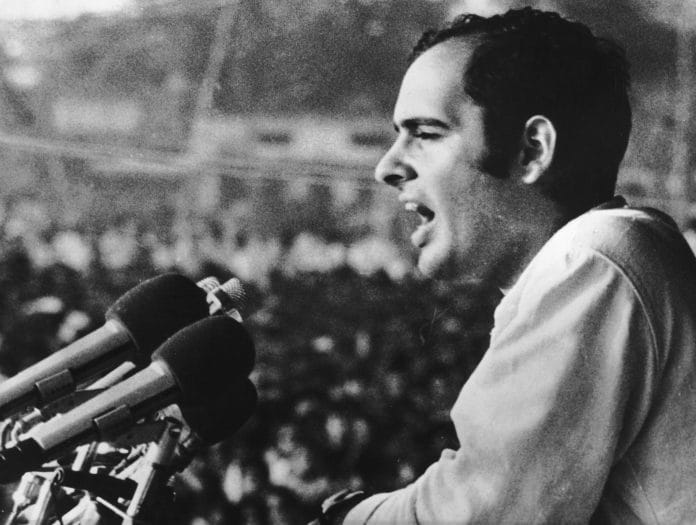Sanjay Gandhi’s excesses showed the problem with dynastic politics. With Maneka and Varun in its fold, the BJP cannot complain about it.
There hasn’t been a greater villain in the politics of independent India than Sanjay Gandhi. Without holding any office, he was an extra-Constitutional authority whose word was the law of the land.
Sanjay Gandhi is so discredited for his alleged excesses during the Emergency that you’d think no politician or party would want to be associated with him, let alone his own Congress party.
Yet the Congress party claimed his legacy on his death anniversary.
We fondly remember Sanjay Gandhi, visionary leader and an advocate of the poor. He championed the need for affordable cars in India. pic.twitter.com/Y2tPx20gH6
— Congress (@INCIndia) June 23, 2018
There’s nothing the Congress party can’t forgive the Nehru-Gandhi bloodstream for, not even the obscene dictatorship of a 29-year-old who manipulated his mother and ruled India like a dictator.
Many leaders of the BJP and the RSS resisted the Emergency and went to jail for it. But today, Sanjay Gandhi is not a bad name in the party. Just before the 2004 Lok Sabha elections, his widow Maneka Gandhi joined the BJP and so did his son Varun Gandhi, who has variously been known as Feroze Varun Gandhi and Varun Sanjay Gandhi.
The BJP is observing Emergency’s 43rd anniversary today as a Black Day. Maneka and Varun Gandhi will be conveniently absent from the photo-ops.
Sanjay Gandhi died in a plane crash because he thought he’d live forever and didn’t need to follow the safety precautions. But the spirit of the Emergency lives on in Indian politics.
1.Contempt for democracy: Civil liberties were curtailed, fundamental rights were suspended, the press was subjected to pre-publication censorship, and opposition leaders were put in jail.This temptation to misuse the might of the state to silence political opposition and the media still exists in Indian politics. Political opponents are not blatantly jailed for political reasons, but they face corruption and other inquiries unless they belong to the ruling party.Faced with rising online criticism, the UPA-2 government had enacted internet censorship laws under which it was putting cartoonists in jail. Similarly, there are many who are getting arrested for criticising Prime Minister Narendra Modi.The media is always under pressure to toe the government line. Journalist Barkha Dutt recently claimed she’s almost been threatened by the government to not work on a new TV channel. Licenses are not being given for freshnews channels, except for those who are allegedly going to act as government propaganda. In her brief stint as I&B minister, Smriti Irani tried to tame the media in her own way.
2. Dynastic politics: When Indira Gandhi lost the post-Emergency election in 1977, Rajiv Gandhi said,“I will never forgive Sanjay (Gandhi) for having brought mummy to this position”. Rajiv Gandhi entered politics because “mummy” needed him. Maneka and Varun Gandhi were inducted into the BJP to embarrass the Congress.Sanjay Gandhi’s alleged excesses showed what the problem with dynastic politics is. When the dynast thinks he owns the country because his mummy is the prime minister, that’s when there’s a problem with dynasty. That sense of entitlement can endanger democracy. But dynastic politics continues in all parties, from Kashmir to Kanyakumari. With mother-son Maneka and Varun in its fold, the BJP can hardly complain about it.
3. Quick-fix solutions: Sanjay Gandhi was so proud of his sterilisation drive that he thought he’d be remembered for it – in a good way. Targets were set for the bureaucracy, and strict penalties were prescribed for not meeting them. Millions of men were sterilised against their wishes, especially Muslims and the poor. Similarly, slums were bulldozed overnight and people were forcibly relocated. These quick-fix solutions, it was later evident, actually caused more problems. Family planning efforts actually suffered a setback for a while.Indian politics still has that temptation for quick-fix solutions which impede democracy. One big example of this was the November 2016 demonetisation of high-denomination Indian currency. People couldn’t withdraw their own money for weeks, there were those who committed suicide because of cash crunch, the economy slowed down for several quarters, and no black money was destroyed.
4. Crony capitalism: The Congress party is hailing Sanjay Gandhi for championing affordable cars, and Varun Gandhi is defending his late father on the same count.The Congress and the BJP seem to be on the same page then, white-washing the scam that was the Maruti project.Sanjay Gandhi went abroad to do an internship with Rolls-Royce because he loved cars. He didn’t even complete the internship, returned to India in 1968 and started setting up Maruti as a private company. All rules were broken to make Maruti possible but the car couldn’t become a reality. There were allegations of corruption and nepotism, land grab and cronyism, but Maruti didn’t take off in his lifetime. It wasn’t Sanjay Gandhi but Japan’s Suzuki which made Maruti possible, only after his death.A politician’s son getting undue favours, gaming the system, and making money doesn’t shock us. It is normal. Robert Vadra and Jay Shah are only among the more prominent political names to have faced such allegations. Across India, political sons seem to be great entrepreneurs by birth.
5. Manipulation of the judiciary: In its greatest moment of shame, the Supreme Court of India legitimised the Emergency. With the government and the judiciary at loggerheads, the independence of the judiciary remains a concern. With four Supreme Court judges (one of them retired last week) doing a press conference against the Chief Justice earlier this year, we were reminded that institutions are only as good as the people who lead them. A strong executive always desires a pliant judiciary.






